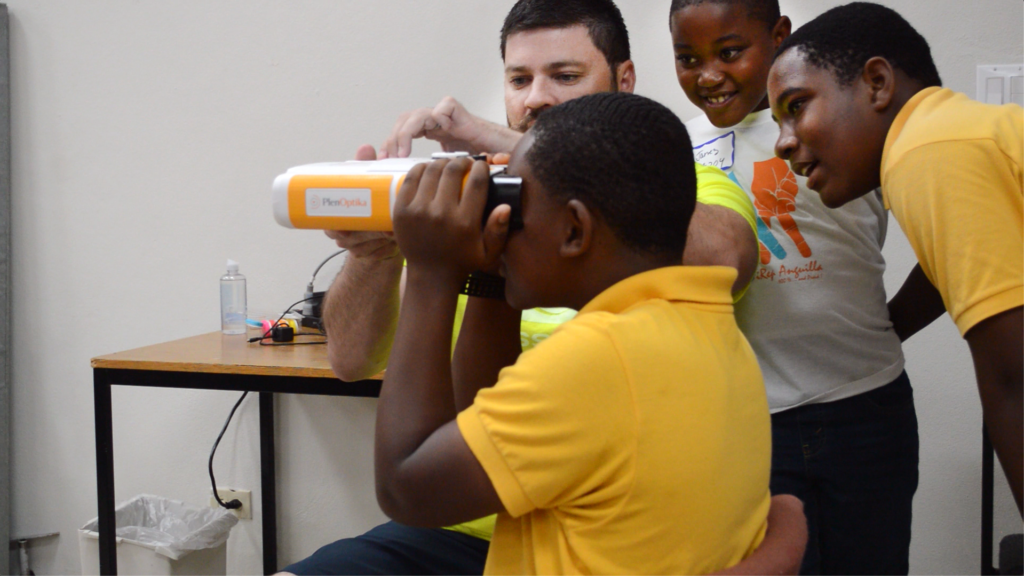
Cambridge, Massachusetts, April 1 – This month, the Southern Educational Conference of Optometry (SECO) is offering “a first look at the research, technology, and techniques that are evolving patient care and propelling the optometric profession forward.” One instrument maker noted that ODs should be aware of four colleagues who have been evolving patient care in recent years.
“Along with all the new ideas and technology offered at SECO, we hope the profession will recognize colleagues who perceived the critical vision care needs of patients who cannot access a traditional office setting. By sourcing the world’s most accurate handheld autorefractor, these eye doctors were enabled to provide a very high level of eye care,” noted Shivang Dave, PhD, CEO of PlenOptika, Inc., maker of the QuickSee™ handheld autorefractor.
Following are case studies of these remarkable eye doctors.
1. Delivering a Mobile Service
While performing eye exams in nursing homes, Todd Winkler, OD, an optometrist practicing in Cincinnati since 1995, realized there was an unseen, underserved population and took action. In January 2019, Dr. Winkler started Eye on Convenience, a mobile service to provide high quality eye care to those patients who can’t get to an eye clinic. Dr. Winkler initially assumed his mobile business would be a mix of house calls for patients who simply wanted the convenience of personalized service, those of limited mobility such as the elderly, and people homebound by illness or injury. He quickly found the greatest demand was from this last group. Learn more:
https://plenoptika.com/mobile-care/delivering-personalized-care-with-high-quality-and-confidence/
2. Community-Center Based Vision Care
Dr Garrett Wentz’s commitment to vision care outside the commercial clinical setting traces back to his training in optometry, and an experience in his community’s homeless shelter Paul’s Project in 2017 catalyzed a new enterprise to serve the working poor and homeless. That November, he participated in Project Christmastime at Paul’s Project in which people were fitted with new glasses in time for the holiday season.
“We caught the bug for it, after we saw the reactions of people putting on the glasses,” said Dr. Wentz. “Now we have our own clinic in the Lubbock soup kitchen where we help the working poor and people without insurance. We had a handheld fundus camera and got a QuickSee, which has made our clinic very efficient. And we have our own circular frame and lens equipment so patients can walk out with glasses the same day,” said Dr. Wentz. Learn more:
https://plenoptika.com/mobile-care/20-20-vision-for-eyes-and-lives/
3. Aid Missions for Community Health
“There was no technology available” for refraction in the Ugandan village where Dr Randall Thomas, volunteering with Mission Servants Ministry in August 2019, provided aid to over 800 adults and children. “We took QuickSee because I am convinced it’s spot on…we relied on its accuracy to render prescriptions.”
Dr Thomas, Bob Hillebrand (Mission Servants Ministry co-founder and CEO), and other volunteers from North Carolina travelled to collaborate with local organizations Child Redeemed Mission Home and Bwase Redeemed Church, 125 miles northeast of Entebbe, to provide a combination of aid services, including physical, practical, and spiritual support. Two days of air and ground travel, over 125 pounds of supplies per person—it was Mission Servants Ministry’s 28th such trip. Learn more:
https://plenoptika.com/mobile-care/enabling-self-determination-with-vision-and-compassion/
4. Vision Care Delivered to Natural Disaster Areas
On September 6, 2017, Hurricane Irma swept westward across the Caribbean, causing catastrophic damage along its path. The islands of Anguilla and St Maarten were not spared: homes were wiped away, roads submerged, and estimated losses between the two communities exceed $4 billion.
“These communities were poor to begin with,” said Dr Alan Glazier, a Rockville, Maryland optometrist who led a vision care mission there. “The hurricane caused people who had very little to lose almost everything else.”
A team of eight ODs and 16 support staff, backed by Essilor, traveled to the islands on March 27-29, 2019 and screened more than 1,000 patients. Most patients were students, and after the screening about 60% of the patients received free new eyeglasses. Dr Glazier notes that many children who needed eyewear never had it, and many who did lost their glasses in the storm. Learn more:
https://plenoptika.com/mobile-care/restoring-vision-where-much-was-lost/
Are you ready to learn how to use QuickSee Free / Free Pro effectively? Tell us about yourself and your circumstances and we will reach out to arrange a training session with you.